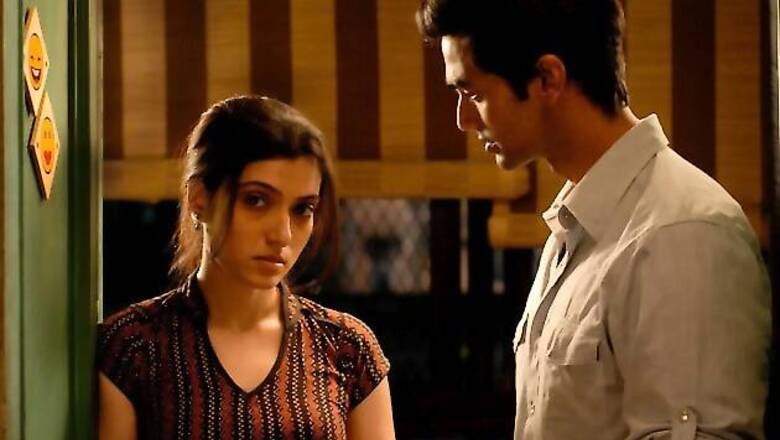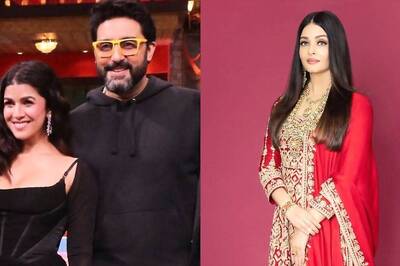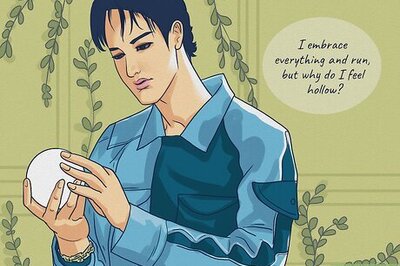
views
Ekti Tarar Khonje, directorial debut of Bengal's best known cinematographer Abhik Mukherjee, is about Abhishek (Shayan Munshi), a young, orphan from the suburbs who moves to Kolkata to become an actor.
Before leaving, he discovers to his shock, that he can see flashes of the future through his gift of foresight. His friend Dev (Rudranil Ghosh) helps him find a roof and an audition.
The ancestral mansion, where he steps in as tenant, opens up a world he has never known before. He falls in love with Rani (Arpita Chatterjee), the landlord’s niece from Kurseong who is in town to seek fresh pastures. The love is underplayed, subtle, slow and poetic despite the no-nonsense, practical air about it. This part is the only saving grace of the convoluted storyline.
Abhishek’s first audition ends in a fiasco, leading him into another flash that makes him foresee the sudden death of a city don, whose capped head remains in the shadows. The don’s identity is revealed in the end but most could unravel the mystery man from his first shot, never mind the voice distortion.
One fails to understand why, when the film’s foul-mouthed director (Arijit Dutta) offers Abhishek the second lead, Abhishek accepts Ganga (Dibyendu Bhattacharya), the don’s right-hand man’s offer for a high-salaried job in their ‘agency'.
The multiple perspectives in the screenplay are not carried to their logical ends.
We never learn whether Abhishek becomes a film actor or not. His discovery of his sixth sense disappears halfway through only to recur once towards the end. Hhis love for Rani is neither here not there; his admiration for the learned Ananda Babu (Dhritiman Chatterjee) is too sudden to be natural; his unwitting involvement with the underworld goes against the grain of his character....
There is a constant clash between Abhishek's illusory world where he shoots down one of the members of the team and the reality in which he hops into a taxi with Dev to make his escape. Yet, in the end, we find him wandering the streets of Kolkata with Rani who was about to go away to Bangalore.
The element of thugee killings Rani discovers from a library in the middle of the night and then by Google search has little logic and makes no sense.
The commercial insertions from a famous skin care clinic and a jewellery house are artificial and superimposed.
Some of the characters and incidents could have been dispensed with such as the young gay boy who is mercilessly killed thugee style; or, the cold-blooded killing of the owner of prime property.
Biplab’s character could have been dispensed with. Ditto for the Hindi song that echoes a scene from Sathya.
The redeeming factor is the mind-blowing music by Prabuddha Banerjee, the lyrics penned by members of Chandrabindoo, Shilajit and one more, and the rendering of the songs.
Arpita and Shayan are natural and sparkling. Dibyendu’s performance is good too. The rest pass muster.
Technically, the film carries sparks of brilliance – cinematography capturing the core of a Kolkata we are not familiar with, mood editing in the jet-paced scenes juxtaposed against the leisurely pace of the song sequences; the production design that throws open the post-modernist world illustrated beautifully in Ananda Babu’s room. Can one really gain from the technique alone if there is no cohesive storyline?
The problem with a gifted technician making his directorial debut is his over-riding ambition to direct the best film ever made on Planet Earth. Nothing wrong in dreaming. But the dream must be rooted in at least a modicum of a credible premise.
When one comes out of the theatre, one does not know what the story was all about, or, not meaning to be unkind, whether there was a story at all.
Critic: Shoma A. Chatterji




















Comments
0 comment